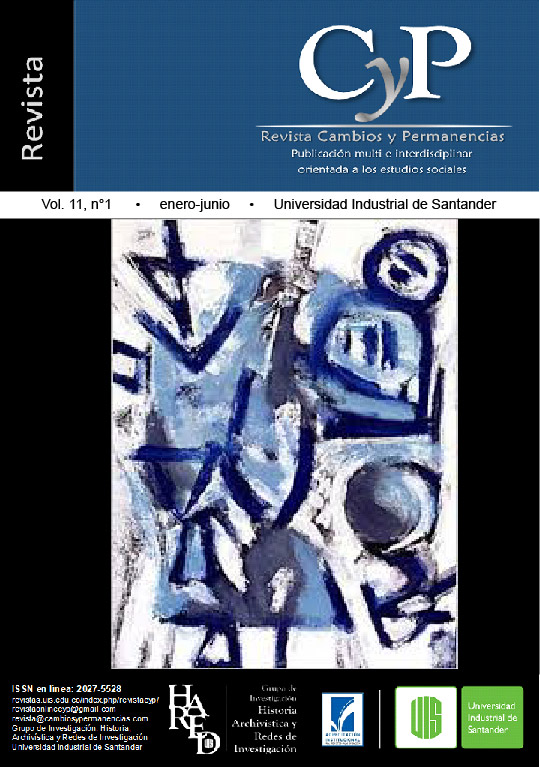Published 2020-06-30
Keywords
- Memory,
- Biography,
- Life trajectories,
- Institutional analysis
How to Cite
Abstract
This essay elucidates some of the reflections we have constructed regarding the perspective of institutional analysis in terms, especially, of its epistemic and methodological approach, as part of an ongoing evaluation of ways to address our object of study, of the processes in which researchers find themselves involved, of the complexity of data analysis, and of the type of narratives we edify from a focus whose priority is to allow the voices of actors to be heard, but that also seeks an equilibrium with the theoretical discussions and documentary sources through which we can objectivize our findings. Our interest is to demonstrate the constructs that make up the instituting dimension of social, work and educational institutions from a hermeneutical perspective, aided by the contributions of Institutional Analysis.
It is from these perspectives that we approach the cultural dimension of institutions and their actors, for they allow us to recover movements generated through institutional proposals, and professional, group –even family– trajectories marked and traversed by seisms and fissures that, at the same time, provide glimpses of differentiated progressions and temporalities. This background makes it important to address those transformations through the meanings that actors ascribe to institutional or group mandates, as a means of analyzing how institutions simultaneously contain and configure trajectories of professional and academic life.
Our approach centers, fundamentally, on documenting the trajectories of university scholars and the sociocultural constructions they generate through their institutional linkages, and on demonstrating the constructs of which the instituting dimension of educational institutions is made up.
Downloads
References
Bruno, P. (2009). Reseña del libro: François Dosse, La apuesta biográfica. Escribir una vida. Prismas, 13(1).
De Certeau, M. (1996). La invención de lo cotidiano, Tomo I. México: UIA.
Dosse, F. (2011). El arte de la biografía. Entre historia y ficción. México: Universidad Iberoamericana.
Fernández, L. (1994). Instituciones educativas. Buenos Aires, Argentina: Paidós.
Fernández, L. (1996). Crisis y dramática del cambio. En I. Butelman (comp.), Pensando las instituciones. Buenos Aires, Argentina: Paidós.
Fernández, L. (2004). Prólogo. En Eduardo Remedi (Coord.), Instituciones Educativas. Sujetos, historia e identidades. México: Plaza y Valdés.
Kaës, R. (1996). La institución y las instituciones. Estudios psicoanalíticos, Buenos Aires, Argentina: Paidós.
Landesmann, M., y Ickowicz, M. (2015). Historias, identidades y culturas académicas. Cuestiones teórico-metodológicas. Liderazgos, procesos de afiliación, transmisión e innovación. México: Juan Pablos Editor.
Remedi, E. (Coord) (2004). Instituciones Educativas. Sujetos, historia e identidades. México: Plaza y Valdés.
Ricoeur, P. (2003). La memoria, la historia, el olvido. Madrid, España: Trotta.
Romo Morales, G., Romo-Beltrán, R. M., y Ruiz, E. (2019). Sujetos de la educación, cultura y mercados de trabajo. En C. Palomar Verea., y A. Fregoso, Educación y reflexividad: repensando los fundamentos del Doctorado en Educación de la Universidad de Guadalajara (pp.55-81). Guadalajara, México: Universidad de Guadalajara.
Romo, R. M. (2011). Estudios socioinstitucionales. Trayectorias, implicación y métodos. Guadalajara, México: Universidad de Guadalajara.
Romo, R. M. (2015). El exilio de académicos argentinos en México. Reflexiones metodológicas al análisis de un caso. En M. Landesmann., y M. Ickowicz. Historias, identidades y culturas académicas. Cuestiones teórico-metodológicas. Liderazgos, procesos de afiliación, transmisión e innovación. México: Juan Pablos Editor.
Torres, R. M. (2004). La narratividad de la vida, una lucha frente a la muerte y el olvido. En E. Remedi (Coord.), Instituciones Educativas. Sujetos, historia e identidades. México: Plaza y Valdés.

